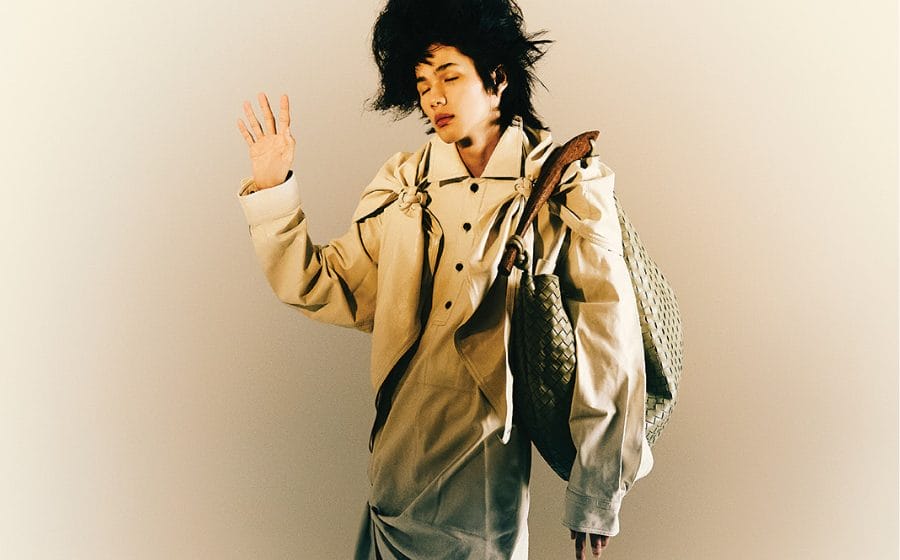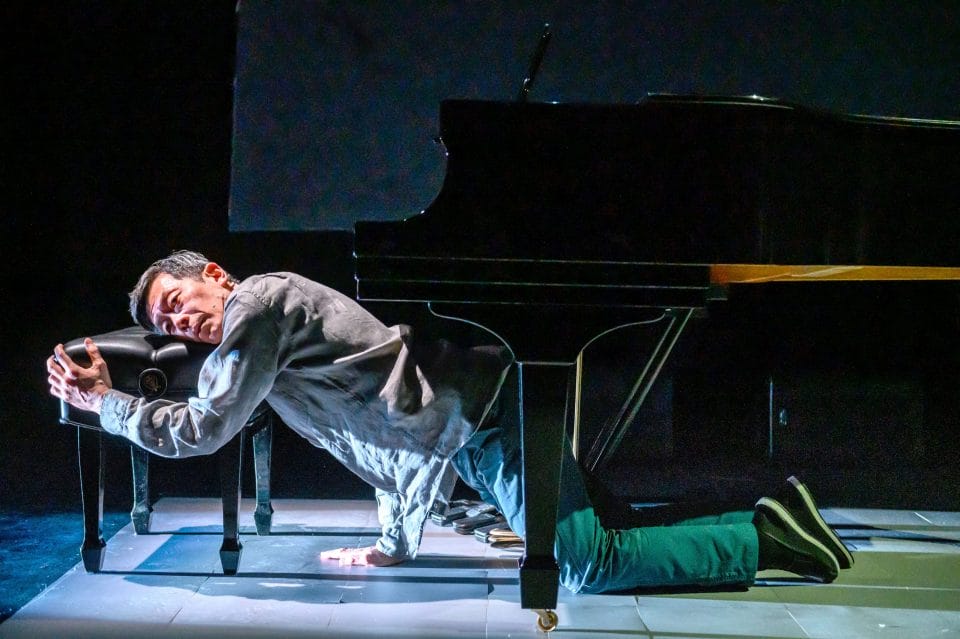 Njo Kong Kie, creator and performer of the critically-acclaimed theatrical concert I Swallowed a Moon Made of Iron, on growth in repetition, the power of words and finding solidarity in the honourable fight for the human condition.
Njo Kong Kie, creator and performer of the critically-acclaimed theatrical concert I Swallowed a Moon Made of Iron, on growth in repetition, the power of words and finding solidarity in the honourable fight for the human condition.
When you are young, dreams aren’t as unrealistic as the word’s definition makes it out to be. For most, we desire for simple things that are somewhat attainable or within our means; a safe, cosy home, a life walked with a plentiful company of friends and family, carving a career out of an industry we either have an immense passion or talent for. But for some others, wanting more is to yearn for the bare minimum; the word “dream” is merely a utopia they wish to return to every night, after spending waking hours in a place or situation that is anything but made of (or even aware of) dreams.
This is what Chinese worker-poet Xu Lizhi depicted in his sparse and profound poetry, the collection of 200 poems found only after news of his suicide came out in 2014 — four years after the wave of Foxconn suicides garnered global media controversy. It was a glimpse into the life of someone who, at the tender age of 20, left the rural area of Guangdong province to work in the assembly line of Foxconn in Shenzhen, making electronic parts for digital devices. Penning down his hopes, dreams and struggles under the unbearable weight of existence in brutal working conditions gained him recognition as one of the best in China’s worker-poet literary movement, but was also what got caught the attention of composer, pianist and music theatre creator, Njo Kong Kie, to respond with urgency.
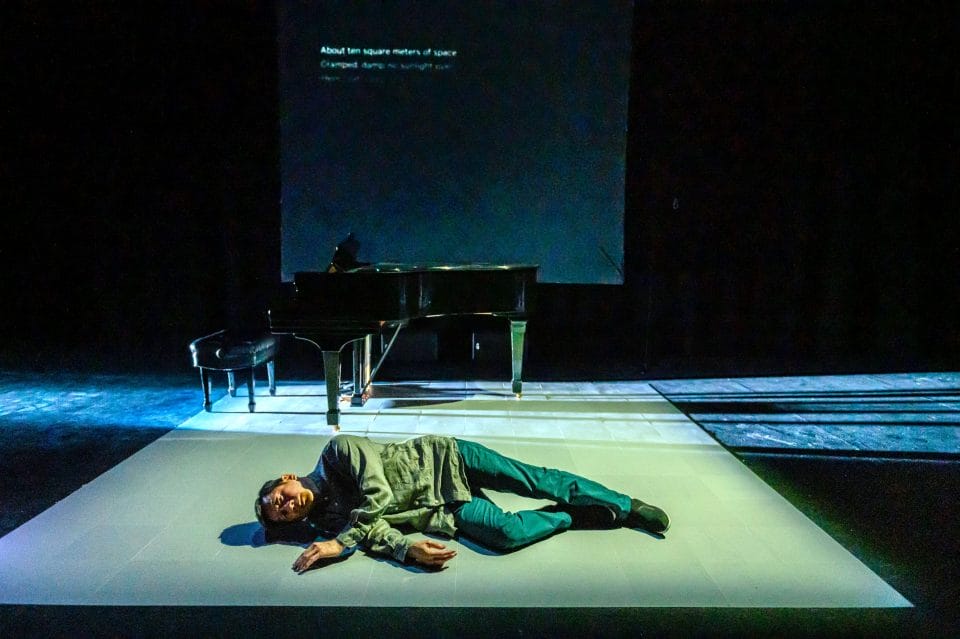 In an ode to the gripping words of Xu, Kong Kie devised I Swallowed a Moon Made of Iron, a theatrical concert that debuted right in the midst of the pandemic. Ahead of this critically-acclaimed work’s Southeast Asian premiere in a one-night-only show here in Singapore, we speak to the mastermind behind this provocative staging to learn more about his creative process, how his journey in performance brought him from backstage to performing on stage, engaging with an audience that shares the native tongue in which the poems were made in, and how spending so much intimate time with Xu’s visceral works have impacted his understanding of humanity, empathy, and the unifying power of performance art.
In an ode to the gripping words of Xu, Kong Kie devised I Swallowed a Moon Made of Iron, a theatrical concert that debuted right in the midst of the pandemic. Ahead of this critically-acclaimed work’s Southeast Asian premiere in a one-night-only show here in Singapore, we speak to the mastermind behind this provocative staging to learn more about his creative process, how his journey in performance brought him from backstage to performing on stage, engaging with an audience that shares the native tongue in which the poems were made in, and how spending so much intimate time with Xu’s visceral works have impacted his understanding of humanity, empathy, and the unifying power of performance art.
Hi Kong Kie! How are you feeling about the tour so far?
We are absolutely excited about this upcoming tour to South East Asia. Singapore is in fact our first stop, so you can say that we are just getting started. I am very eager to be reunited with our team from Vancouver, Macau and Hong Kong, some of whom I have not seen since the start of the pandemic in 2020. As performing artists, the opportunity to travel so far to share our work is always a privilege, and in light of what has happened in the last three years, even more so. We all count our blessings. The anticipation is exhilarating. I last performed in Singapore in 2008, so it has been a long time. And I am coming back with our own show so it is doubly exciting!
Before we dive into I Swallowed a Moon Made of Iron, tell me — how did you first get into music?
Sibling rivalry! My sister was given piano lessons, so I wanted lessons as well. That’s how it started. Professionally, I first got into the industry by accompanying students in their vocal lessons, so voice has always been a major part of my work. It was only later that I branched out to musically accompany ballet classes which then led to an opportunity to perform in Singapore at the Singapore Arts Festival with dance company La La La Human Steps (Canada) back in 2008!
With the objective of expanding my horizon further, I ended up enrolling in an opera creation workshop which led me down the path of creating music theatre for the stage.
 How has your time at La La La Human Steps shaped the kind of projects you have taken on after that stint?
How has your time at La La La Human Steps shaped the kind of projects you have taken on after that stint?
The experience of working with the company taught me many things both professionally and artistically. It showed me the inner workings of show production and touring, so when it came time for me to make my own work and bring them on tour, I was not starting from scratch as I already had a base of knowledge to draw from.
Artistically, the experience taught me that repetition can be our friend; that in making original work, we get to determine our own rules and traditions; that our music notation system is in fact insufficient. What ultimately matters is what comes off the page rather than what is on the page. These are all lessons I carry with me as I create work.
Ok, onto your latest work. How did you first encounter Xu Lizhi’s poems?
I first encountered Xu Lizhi’s work around the time of his death in 2014, scrolling idly through social media late one night. The first poem I read of Xu Lizhi was A Single Screw Fell to the Ground in which he compares the life of a worker to that of a screw. It was, sadly, and perhaps also ironically, accompanied by the news that he had just taken his own life. The impact of these two events really shook me. It is as if he was asking us, would you see me as a screw or a human being?
When did you decide that you had to make a work out of it? Was there a particular moment, article or line in his work that pushed you to create?
Oh, immediately upon reading that first poem. The impulse was quite instantaneous. Primal almost. I think for as long as there have been words, people have wanted to sing them. And as a composer, I naturally have that instinct. I spent the better part of that evening looking for other works by Xu. There were already quite a few published online, in Chinese but also some translations. I wrote to my co-producer partner that evening and made a proposal. It took a few years for us to get the work created but that impulse or instinct was really quite primal.
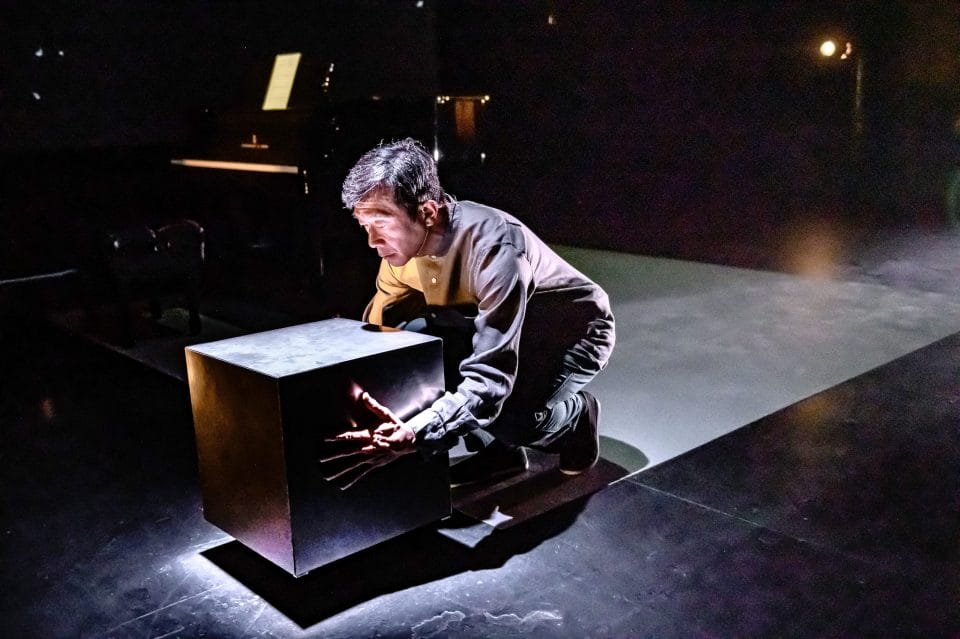 Your interpretation of Xu’s poems spans voice, piano, video and the stage. How did his words guide your creative process?
Your interpretation of Xu’s poems spans voice, piano, video and the stage. How did his words guide your creative process?
In our creation, Xu’s words are truly the guiding light. For the music part, I have several considerations: what is the mood of the poetry? How do I find the musical pairing to either complement or contrast it in order to create tension? These are my first considerations. Once these directions are decided, then it comes the part of setting the words to pitches. This is the detailed part of the process. Considerations are given to the “singability” of the phrases, the intonation of the text, clarity to the listeners and so forth.
Independent to my process, my collaborators also reacted individually to the poems I selected and then offered their own artistic responses. Once everyone’s contribution has been collected, we then went through the process of putting the various elements together.
How did you curate the poems you were going to present for the show?
Xu Lizhi wrote close to 200 poems, mostly written between 2011 and 2014 when he was a factory worker. They can be grouped into several main categories: those that speak directly about his experience as a worker; those that speak to him being far away from home; those that speak about his friends and family. The styles vary a lot as well from the more traditionally structured to the ones that are more conceptual; the ones that are more disquieted compared to the ones that are more satirical in tone. I read through all of his poems, earmarked the ones that jumped out at me right away, and grouped them into categories to make sure we have a wide representation of his work throughout his poetry writing years.
I went through that process repeatedly until the core 7 or 8 poems came to the fore. Over the creation process (which in some ways is still ongoing as we continue to tweak the production), other poems were added to the repertoire. They are not necessarily sung pieces, but they feature prominently in the show as well.
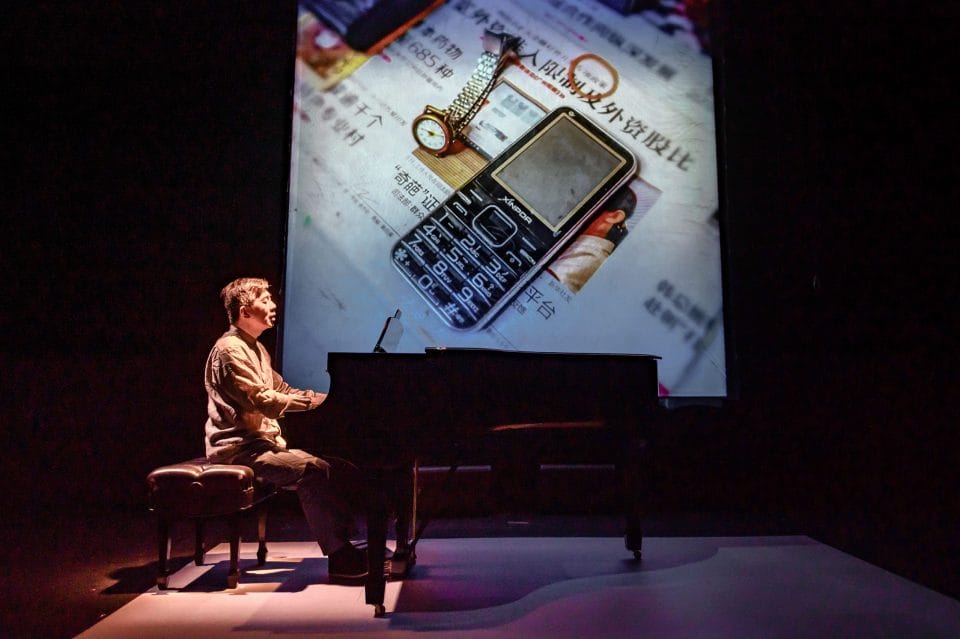 Which poem resonated with you the most?
Which poem resonated with you the most?
It changes over time of course. I admired each of them for their uniqueness. But lately, the poem “Mother” speaks to me the most. The acuteness of his observation of day-to-day domesticity, the description of sacrifices mothers make for their children, the pride they take in seeing them grow. It is truly a homage to all mothers and it has always been very touching to me. And having lost my mother in the recent year, this poem becomes ever more poignant every time I sing it.
Has performing this over the course of the pandemic changed the way you approached or presented the work?
We did perform this piece several times during the pandemic, and due to circumstances, we did have to adapt it each time we put it up. We did two performances online; once as a recital, where I experimented with talking to the audience directly (in our original production, I did not); the second time we moved the whole stage production to my apartment in Toronto. We had to make a lot of adjustments because of the reduction of scale. But somehow it was fitting, as one of Xu’s poems describes his world being contained in this tiny room. And all the production elements were there, the video, the lighting design, the blocking on stage — that was a special experience as we were able to pay closer attention to the streaming medium and to work it to our advantage, doing things that we normally could not have done on stage. So that was a good teaching moment — that there are many ways of doing the show. There is no reason to believe that there is only one presentation format. Each comes with its own considerations. But always trust in the poems to deliver as the construction of our materials is really built on that.
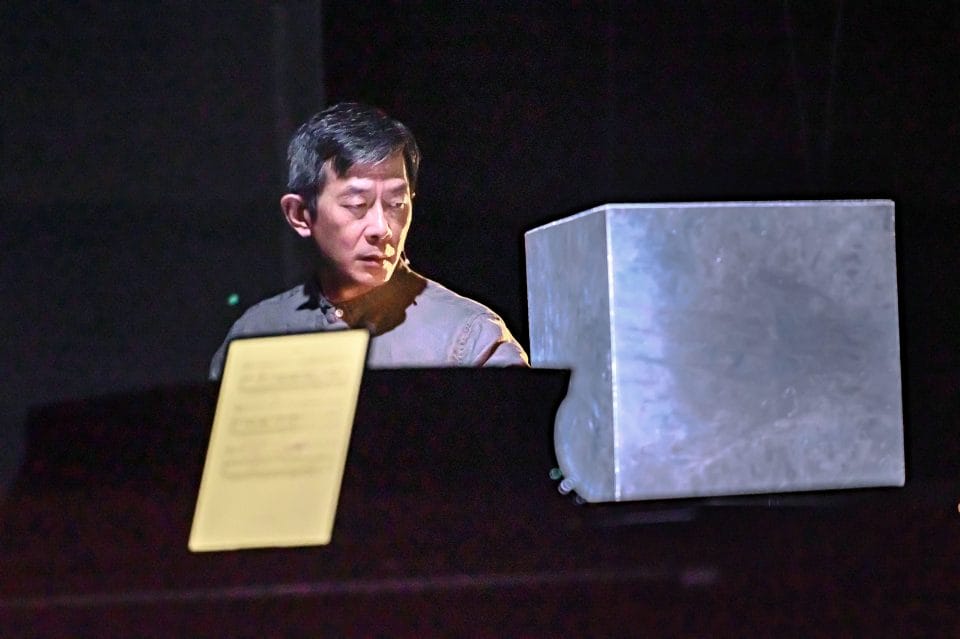 The Southeast Asian premiere of I Swallowed a Moon Made of Iron marks the first time this piece will be performed to a large Mandarin-speaking population. What does that make you feel as the performer and creator of the show, in terms of the reception of your messages, as well as the nuances that come with Xu’s poetry?
The Southeast Asian premiere of I Swallowed a Moon Made of Iron marks the first time this piece will be performed to a large Mandarin-speaking population. What does that make you feel as the performer and creator of the show, in terms of the reception of your messages, as well as the nuances that come with Xu’s poetry?
Playing in front of a Mandarin-speaking audience is always extra special as they would have another layer of understanding of the poetry than those relying on the translation of the text. Our translations are faithful to the original, and we parse them in such a way that is conducive to the audience’s experience and reception of the words; however, understanding each word as I sing them does allow the audience to understand more the nuances of my intention as a creator and interpreter.
Playing in front of a large Mandarin-speaking audience also puts me on high alert as Mandarin is not my mother tongue. It is something I constantly try to improve on. We have had individual Mandarin speakers turning up in our audience before too, their common feedback would be “Yes, we understand everything; but we know you are from the south”. Haha! Being born in Indonesia, perhaps my Mandarin is closer to the Mandarin being spoken in the region.
In any case, I will let the Singapore audience tell me what they think!
Where does the incorporation of your Chinese heritage sit in this work?
Yes, my own Chinese heritage plays an essential role in this work. For one thing, it allows me to set the text to music with a certain sense of confidence, even if Mandarin is not my first language. That would be Hokkien; and I am most comfortable in Cantonese for sure. In deciding to set the poetry to song, the first consideration for me is to decide whether to set them in Chinese or the English translation (since I live in Canada), and then whether to set them in Mandarin or Cantonese. Ultimately, we decided on Mandarin because from research, that is how the poet had read them in public. We want to honour that, as it preserves the original character of the poetry.
If you could, what would you like to say to Xu if you had a chance to speak to him?
I would ask him how he was.
I would thank him for sharing his talent so fully with us.
I would thank him for expressing the plight of workers so powerfully.
I would thank him for showing us the magnificence of poetry.
I would thank him for giving us the most touching poem about mothers.
I would thank him for providing the creative impulses to our team to make this work.
I would ask what he thinks of our effort in his honour.
I would wish him well.
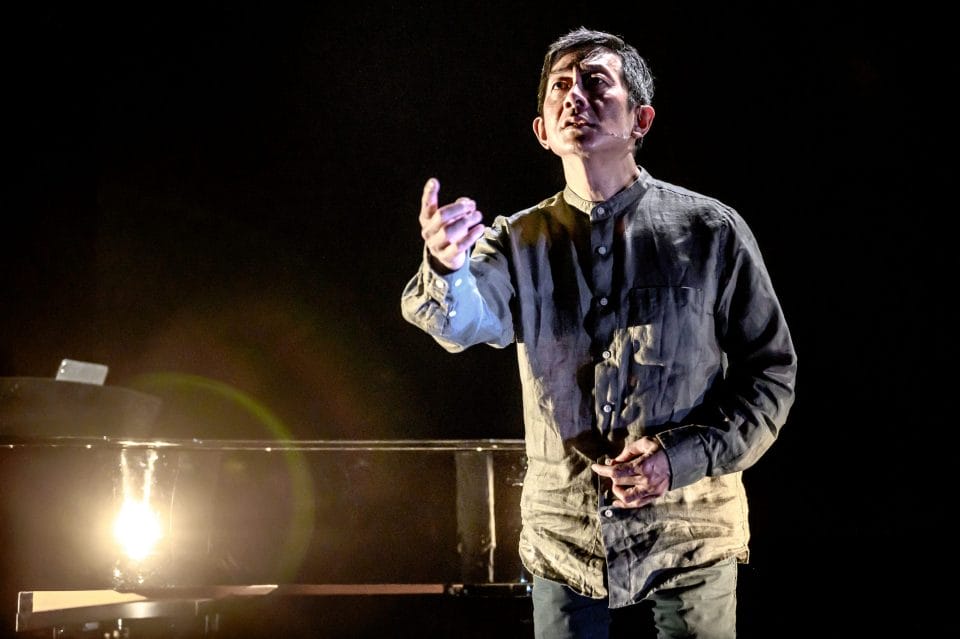 Last but not least, what message would you want your audience to leave with after watching I Swallowed a Moon Made of Iron?
Last but not least, what message would you want your audience to leave with after watching I Swallowed a Moon Made of Iron?
We made this work from two impulses, as artists responding to Xu’s poetry; and as fellow human beings responding to his plight. We would love to share these responses with the Singapore audience. If you already know Xu Lizhi’s poetry, then you already know that they are powerful words. If you don’t, come and discover his immense talent as a poet. We have been told that our production deepens the audience’s experience of these poems. The form of the production may or may not be familiar to you, but the poetry will be there to guide us through our hour together. We hope you would join us.


